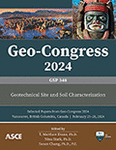Sedimentation Characteristics and Retention Ratio Calculation of Dredged Soil
Publication: Geo-Congress 2024
ABSTRACT
Retention rate refers to the content of soil remaining in the dumped area compared to the left sample during dredged soil dumping. During reclamation construction, the retention rate calculates the amount of dredged soil, so it is essential to determine the exact retention rate. The retention rate may be calculated differently depending on the soil characteristics, but currently, in the case of dredging and reclamation on the West Coast, the retention rate is empirically applied at 70%–95%, or the amount of dredged soil is calculated through examples of application of retention rates in similar districts nearby. Accordingly, in this study, to accurately calculate the retention rate, a separate sedimentation model test was conducted using dredged soil at the location where the actual project was carried out. Separated sedimentation characteristics were confirmed through mechanical and physical tests for each deposition distance, and the retention rate was calculated to be 89.0%, which is relatively higher than the literature and existing cases. This study was used as primary data to confirm the feasibility of the road construction project connecting the Saemangeum area to the north and south.
Get full access to this article
View all available purchase options and get full access to this chapter.
REFERENCES
E.-C. Shin, Y.-J. Park, and J.-K. Kang. (2017). “Retention ratio of dredged soil at Incheon habour route using self-weight consolidation test.” Journal of the korean geosynthetics society, 16(4), 57–66.
Gyeonggi Pyeongtaek Port Corporation. (2007). Pyeongtaek Dangjin Port.
H. Kim, Y. Han, and W. Yu. (2013). “A study on the mechanical characteristic and shear strength characteristic on elapsed time of the western sea dredged soils.” Journal of the Korean geo-environmental society, 14(2), 31–41.
H.-J. Kim, M.-B. Shim, H.-S. Jeon, M.-S. Lee, P.-S. Peak, and D.-I. Choe. (2006a). “A study on the property of dredging soils stratified by two dimensional segregating sedimentation.” Journal of the Korean geotechnical society, 22(12). 481–488.
H.-J. Kim, M.-S. Lee, P.-S. Paek, and H.-S. Jeon. (2006b). “Estimate on the self-weight consolidation of dredging coarse soil with segregating sedimentation properties.” Journal of the Korean geotechnical society, 22(12), 5–14.
Incheon Free Economic Zone Authority. (2009). Songdo International City Reclamation Construction.
Incheon International Airport. (2000). Incheon International Airport construction.
Incheon Regional Maritime and Port Office. (2008). Incheon New Port.
Korea Rural Community Corporatio. (2010). Saemangeum Waterproofing.
M. Park, J. Lee, H. Shin, and S. Lee. (2011). “Characteristics of the segregation sedimentation for dredged soil depending on fines content.” Journal of the Korean geo-environmental society, 12(6), 25–34.
S.-Y. Kim, H.-P. Choi, J.-E. Park, and S.-W. Kim. (2002). “A study on the estimation method of loss ratio in dredged fills.” Journal of the Korean geo-environmental society, 3(1), 66–77.
S. Lee, and J.-K. Jeon. (2002). “Sedimentation and consolidation characteristics of dredged soils mixed with sand materials.” Journal of the Korean geotechnical society, 18(2), 75–86.
Information & Authors
Information
Published In
History
Published online: Feb 22, 2024
ASCE Technical Topics:
- Construction engineering
- Construction management
- Dredging
- Engineering fundamentals
- Feasibility studies
- Geomechanics
- Geotechnical engineering
- Methodology (by type)
- Model accuracy
- Models (by type)
- Project management
- Research methods (by type)
- Retaining structures
- River engineering
- Sediment
- Soil analysis
- Soil mechanics
- Soil properties
- Water and water resources
Authors
Metrics & Citations
Metrics
Citations
Download citation
If you have the appropriate software installed, you can download article citation data to the citation manager of your choice. Simply select your manager software from the list below and click Download.
